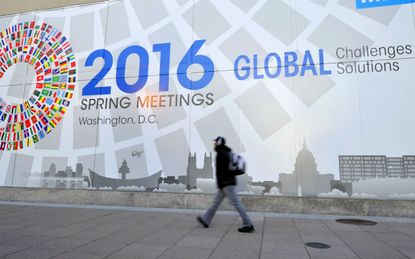World Bank signals 'fundamental' climate change shift
More than a quarter of investment will now go directly to help developing world fight global warming

The World Bank has signalled a "fundamental shift" in its funding policy which will see tens of billions of dollars channelled into projects to fight climate change.
Officials announced that in future, 28 per cent of all World Bank's investment would go into projects that, for example, aim to rapidly increase renewable energy capacity across the developing world. This will amount to at least $16bn (£11bn) a year by the end of the decade, notes The Guardian, with up to a further $13bn (£9bn) being "leveraged" from the private sector.
In addition, the organisation said that all of its future spending decisions would take account of the impact on the environment, a response in part to criticism that it has funded fossil fuel-based energy projects.
Subscribe to The Week
Escape your echo chamber. Get the facts behind the news, plus analysis from multiple perspectives.

Sign up for The Week's Free Newsletters
From our morning news briefing to a weekly Good News Newsletter, get the best of The Week delivered directly to your inbox.
From our morning news briefing to a weekly Good News Newsletter, get the best of The Week delivered directly to your inbox.
"This is a fundamental shift for the World Bank. We are putting climate change into our DNA," said John Roome, a senior director for climate change.
Along with its fellow development banks which are part of the World Bank Group, the funding body was made the "lynchpin" of a pledge agreed in Paris in December to provide $100bn (£71) of funding to poor countries to help them adapt to a low-carbon world.
At that summit, 195 world leaders vowed action to keep global temperature rises below the two-degree level that scientists frequently cite as a tipping point for catastrophic climate change. In two weeks, the leaders will convene in New York to formally sign that agreement.
"Following the Paris climate agreement, we must now take bold action to protect our planet for future generations," said Jim Yong Kim, the president of the World Bank Group.
"We are moving urgently to help countries make major transitions to increase sources of renewable energy, decrease high-carbon energy sources, develop green transport systems and build sustainable, liveable cities for growing urban populations. Developing countries want our help to implement their national climate plans, and we’ll do all we can to help them."
The new strategy will including funding construction of enough renewable energy to power 150 million homes in developing countries and building early warning systems for climate disasters for 100 million people, says the Guardian.
Create an account with the same email registered to your subscription to unlock access.
Sign up for Today's Best Articles in your inbox
A free daily email with the biggest news stories of the day – and the best features from TheWeek.com
-
 What are Lucy Letby's grounds of appeal?
What are Lucy Letby's grounds of appeal?In depth Convicted former nurse's legal team claims judge at original trial wrongly refused her applications
By The Week UK Published
-
 Grindr 'shared user HIV status' with ad firms, lawsuit claims
Grindr 'shared user HIV status' with ad firms, lawsuit claimsSpeed Read LGBTQ dating app accused of breaching UK data protection laws in case filed at London's High Court
By Rebecca Messina, The Week UK Published
-
 The best dog-friendly hotels around the UK
The best dog-friendly hotels around the UKThe Week Recommends Take a break with your four-legged friend in accommodation that offers you both a warm welcome
By Adrienne Wyper, The Week UK Published
-
 Puffed rice and yoga: inside the collapsed tunnel where Indian workers await rescue
Puffed rice and yoga: inside the collapsed tunnel where Indian workers await rescueSpeed Read Workers trapped in collapsed tunnel are suffering from dysentery and anxiety over their rescue
By Sorcha Bradley, The Week UK Published
-
 Gaza hospital blast: What the video evidence shows about who's to blame
Gaza hospital blast: What the video evidence shows about who's to blameSpeed Read Nobody wants to take responsibility for the deadly explosion in the courtyard of Gaza's al-Ahli Hospital. Roll the tape.
By Peter Weber, The Week US Published
-
 Giraffe poo seized after woman wanted to use it to make a necklace
Giraffe poo seized after woman wanted to use it to make a necklaceTall Tales And other stories from the stranger side of life
By Chas Newkey-Burden, The Week UK Published
-
 Helicopter sound arouses crocodiles
Helicopter sound arouses crocodilesTall Tales And other stories from the stranger side of life
By Chas Newkey-Burden, The Week UK Published
-
 Woman sues Disney over 'injurious wedgie'
Woman sues Disney over 'injurious wedgie'Tall Tales And other stories from the stranger side of life
By Chas Newkey-Burden, The Week UK Published
-
 Emotional support alligator turned away from baseball stadium
Emotional support alligator turned away from baseball stadiumTall Tales And other stories from the stranger side of life
By Chas Newkey-Burden, The Week UK Published
-
 Europe's oldest shoes found in Spanish caves
Europe's oldest shoes found in Spanish cavesTall Tales And other stories from the stranger side of life
By Chas Newkey-Burden, The Week UK Published
-
 Artworks stolen by Nazis returned to heirs of cabaret performer
Artworks stolen by Nazis returned to heirs of cabaret performerIt wasn't all bad Good news stories from the past seven days
By The Week Staff Published